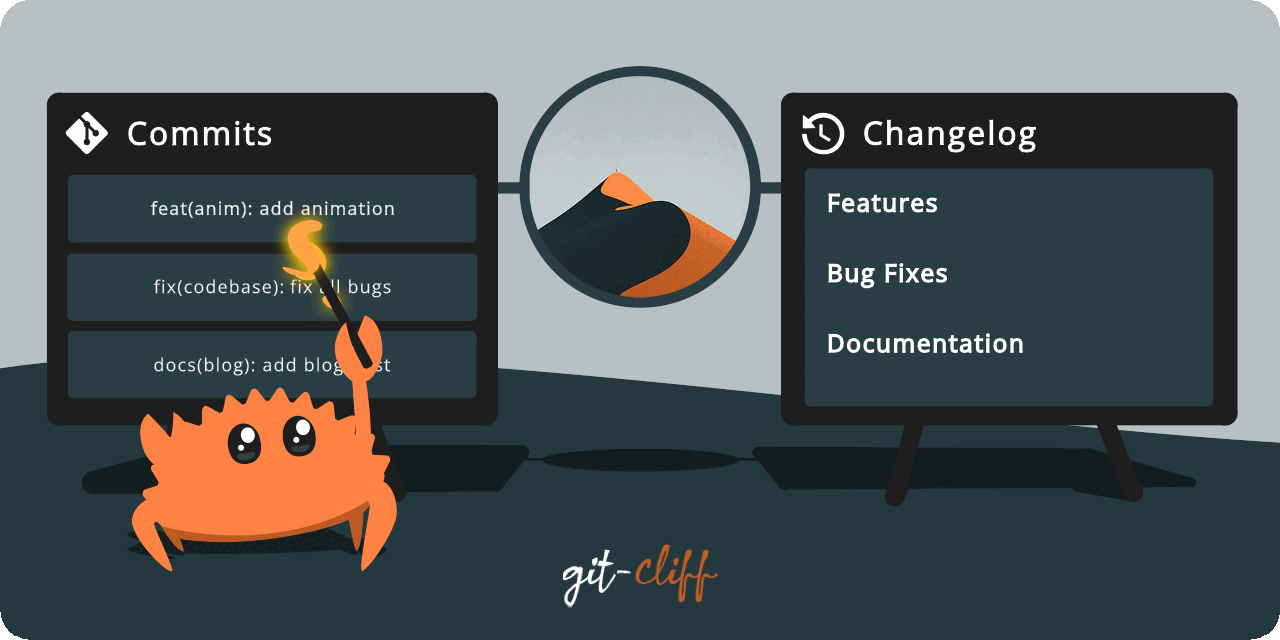Git-Cliff: Automated Changelog Generation
Git-Cliff is a powerful tool for automatically generating changelogs from your Git commit history. By following a structured commit message convention, you can effortlessly create professional changelogs for your projects.
Why git-cliff?
- Automated Changelog Generation: Save time by generating changelogs directly from commit messages.
- Customizable: Define your own rules for grouping commits and formatting the changelog.
- Supports Conventional Commits: Works seamlessly with the widely-used Conventional Commits standard.
Commit Message Format
To get the best results with git-cliff, use the Conventional Commit format:
<type>(<scope>): <description>
<body>
<footer>
Key Points:
- Type: The category of the change (feat, fix, docs, etc.).
feat: A new feature or functionality.fix: A bug fix.docs: Changes to documentation only.style: Code style changes (formatting, indentation, etc.) that do not affect behavior.refactor: Code changes that neither fix bugs nor add features (e.g., code improvements).test: Adding or modifying tests.chore: Non-code tasks (e.g., build system, CI/CD changes).perf: Performance optimization or improvements.build: Changes to the build system or dependencies (e.g., upgrading dependencies).ci: Changes to CI/CD configuration or scripts.revert: Reverting a previous commit.config: Updates to configuration files.deps: Dependency updates (similar to build but specific to libraries/modules).hotfix: Quick fixes for critical bugs (common in agile projects).
- Scope: The specific area/module impacted (optional).
api: API-related changes or endpoints.auth: Authentication and authorization.db: Database-related changes (e.g., schema updates).ui: User interface components.ux: User experience or design improvements.core: Core functionality or utilities.docs: Documentation updates or files.deps: Dependency management (adding, removing, or updating libraries).config: Configuration files or environment settings.build: Build process or pipeline (e.g., webpack, Docker, Makefiles).ci: Continuous Integration/Delivery pipelines.i18n: Internationalization and localization.testing: Testing frameworks or test cases.security: Security updates or fixes.routing: Routing and navigation logic.logging: Logging and monitoring.metrics: Application metrics and telemetry.styles: Styling updates (e.g., CSS or theming).infra: Infrastructure-related changes.deps: Dependency changes (similar to build but more focused).
- Description: A short, imperative description of the change.
- Body: Additional context or motivation (optional).
- Footer: Notes for breaking changes or issue references (optional).
Examples
New Feature
feat(ui): add dark mode toggle
Added a dark mode toggle to the settings menu, allowing users to switch
between light and dark themes.
Bug Fix
fix(api): resolve null pointer exception on login
Fixed an issue where the login API would throw a null pointer exception
if the email field was missing.
Breaking Change
feat(auth): migrate to OAuth2
BREAKING CHANGE: Updated the authentication system to use OAuth2.
Existing users must update their access tokens.
Configuration
Here’s an example .git-cliff.toml configuration file to customize the changelog:
My custom configuration
Here some important parts of my custom configuration
# parse the commits based on https://www.conventionalcommits.org
conventional_commits = true
# filter out the commits that are not conventional
filter_unconventional = false
# process each line of a commit as an individual commit
split_commits = true
The regex parser is flexible and supporting different types
feat,feature,featuresfix,fixesdoc,docsperf,performance,performancesrefactor,refactorsstyle,styleschore,choressecurityrevert,reverts
As well as the legacy commits I did in the past
ADD,addCHG,chgREM,remMOV,movFIX,fixNOTE,noteWARN,warn
# regex for parsing and grouping commits
commit_parsers = [
{ message = "^feat(ure)?s?", group = "<!-- 0 -->🚀 Features" },
{ message = "^fix(es)?", group = "<!-- 1 -->🐛 Bug Fixes" },
{ message = "^docs?", group = "<!-- 3 -->📚 Documentation" },
{ message = "^perf(ormance)?s?", group = "<!-- 4 -->⚡ Performance" },
{ message = "^refactors?", group = "<!-- 2 -->🚜 Refactoring" },
{ message = "^styles?", group = "<!-- 5 -->🎨 Styling" },
{ message = "^tests?", group = "<!-- 6 -->🧪 Testing" },
{ message = "^chores?", group = "<!-- 7 -->⚙️ Miscellaneous Tasks" },
{ message = "^security", group = "<!-- 8 -->🛡️ Security" },
{ body = ".*security", group = "<!-- 8 -->🛡️ Security" },
{ message = "^reverts?", group = "<!-- 9 -->◀️ Revert" },
# Conventional commit exclusions
{ message = "^chores?\\(releases?\\):", skip = true },
{ message = "^chores?\\(deps?.*\\)", skip = true },
{ message = "^chores?\\(pr\\)", skip = true },
{ message = "^chores?\\(pull\\)", skip = true },
{ message = "^chores?\\(version\\):", skip = true },
# Legacy commit styles
{ message = "(?i)^ADD", group = "<!-- 0 -->🚀 Features" },
{ message = "(?i)^CHG", group = "<!-- 0 -->🚀 Features" },
{ message = "(?i)^REM", group = "<!-- 2 -->🚜 Refactoring" },
{ message = "(?i)^MOV", group = "<!-- 2 -->🚜 Refactoring" },
{ message = "(?i)^FIX", group = "<!-- 1 -->🐛 Bug Fixes" },
{ message = "(?i)^NOTE", group = "<!-- 10 -->💼 Other" },
{ message = "(?i)^WARN", group = "<!-- 8 -->🛡️ Security" },
{ message = ".*", group = "<!-- 10 -->💼 Other" },
]
Getting started
- Install
git-cliffcargo install git-cliff - Initialise
git-cliffor create agit cliff --init.git-cliff.tomlfile in your project directory. - Generate: Run the following command to create a changelog:
git cliff git cliff -o CHANGELOG.md git cliff --tag v0.1.1

